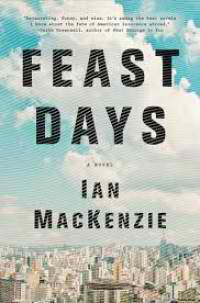Feast Days by Ian Mackenzie
 Friday, March 23, 2018 at 8:41AM
Friday, March 23, 2018 at 8:41AM 
Published by Little, Brown and Company on March 13, 2018
A married couple moved to São Paulo, a city “hairy with crime,” for the husband’s job. The wife, having no opportunity for Brazilian employment, is an observer. Emma narrates her observations of local politics and protests, the contrast between wealth and poverty in Brazil, expensive meals (unlike her husband, she would rather eat food than discuss it), her first experience as a robbery victim, the difficulty of mastering Portuguese, the lure of invented cognates, the glassy apartment buildings that resemble aquariums, and the country’s never-ending social obligations.
Feast Days is a detached account of Emma’s external observations mixed with more personal but still detached observations of her own life. Emma is not terribly satisfied with her lot, but at least while she’s in Brazil, she doesn’t seem inclined to make any changes to enhance her happiness, or even to voice her concerns, perhaps because she doesn’t know what changes she might desire or whether true happiness is attainable.
An affair is on offer, but it hardly seems worth the effort. Emma seems to think that sticking to marriage creates a history, and marriage is nothing more than a shared history of being married. A dull marriage, she thinks, is better than starting over, because nothing is more dull than revealing yourself in each new relationship, telling the same stories, getting fucked in the pretty much the same way by each new boyfriend.
Emma likes to talk, not because she has anything important to say, but because she enjoys “the lapidary construction of sentences,” syntax more important than content. Having no particular skills beyond an affinity for English grammar, Emma resentfully keeps the home and occasionally tutors prosperous Brazilians for cash. She also does volunteer work, helping Haitian refugees while marveling that the Brazilian government treats them well, having a more compassionate attitude about “shithole countries” than American politicians.
Emma is unenthused about the prospect of having a child, a source of largely unspoken conflict with her husband. Emma wonders why men are incapable of talking about anything but their work, and occasionally asks questions like “Is there a market for that?” to make herself understood. She ruminates on the phrase “the disaster of heterosexuality” as a possible explanation for being dissatisfied with her life.
Emma encounters a fair amount of sexism in Brazil, but it might not be as obnoxious as the sexism she endured at a Las Vegas engagement party hosted by her in-laws, where all of the gated community residents wanted to know about her wedding plans and how many children she would have. Nobody asked her whether she had a life; they assumed her job was getting married.
Collateral characters play their roles, but Feast Days is very much Emma’s story. She refers to her husband not by name but as “my husband” or, in flashbacks, “the man who would become my husband.” We learn a bit about Emma’s past from those flashbacks, and a brief chapter gives us a snapshot of her future, but the story’s focus is on Emma’s cabined life in Brazil. Unfortunately, that portion of her life is so uneventful that I would have preferred to read more about her past or future.
Emma loves words and so, I must assume, does Ian Makenzie. His use of words is more interesting than Emma, who is such an uninvolved observer that I found it difficult to warm up to her. She doesn’t seem to feel anything (other than ennui which isn’t really a feeling); she holds no fundamental beliefs that aren’t rooted in etymology. Feast Days appeals to the intellect, not the heart, but I’m recommending it for its prose and for the occasional insights it offers into a life of a woman who has been thrust into a role for which she is ill-suited.
RECOMMENDED



